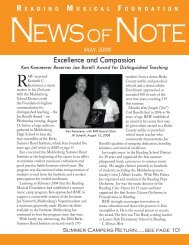One Former Camper's Memories Become a Legacy: - Reading ...
One Former Camper's Memories Become a Legacy: - Reading ...
One Former Camper's Memories Become a Legacy: - Reading ...
You also want an ePaper? Increase the reach of your titles
YUMPU automatically turns print PDFs into web optimized ePapers that Google loves.
With the Gift of a Bassoon to RMF, I Honor a <strong>Former</strong><br />
Music Teacher, Edward J. Gobrecht, Jr.<br />
by C. Thomas Work<br />
The characteristics of great teachers and great<br />
leaders are equally elusive. Like great leaders,<br />
great teachers are passionate about their calling,<br />
inspire, and invariably bring out the best in those<br />
who choose to follow their lead. An idiosyncrasy or<br />
two often memorialize them. Most folks would say<br />
of both groups, “You know one when you see one.”<br />
And that might be the best we can do to define both<br />
great teachers and great leaders.<br />
Edward J. Gobrecht, Jr. was one of five children<br />
born to a shoemaker and his wife in Hanover,<br />
Pennsylvania, 85 years ago. By the age of five, Ed<br />
had learned the cornet, and by seven was performing<br />
with the Penngrove Band, Redman’s Band in East<br />
Berlin, and Southern York County Band. He<br />
eventually learned to play nearly every instrument<br />
of the concert band and, as a child, occasionally<br />
conducted bands in his father’s place when his father<br />
had conflicting engagements. Confronted with the<br />
choice of an oboe, a bassoon or a French horn to<br />
play in junior high school, Ed picked the one with<br />
the oddest sound and appearance - the bassoon!<br />
Six months later, Ed was playing bassoon with<br />
the York Symphony under Louis Vyner, a graduate<br />
of the Curtis Institute of Music who later led<br />
the <strong>Reading</strong><br />
Symphony<br />
Orchestra, from<br />
1961 until 1976.<br />
At 16 years of<br />
age, Ed became<br />
the principal<br />
bassoonist of<br />
the Harrisburg<br />
Symphony.<br />
Because he was<br />
still in public<br />
C. Thomas Work<br />
school, Ed required<br />
his high school<br />
principal’s permission for early dismissal so that he<br />
could perform with Harrisburg’s orchestra!<br />
But Ed credits four summers of music camp with<br />
his decision to devote his life to music performance<br />
and music teaching.<br />
Ed was drafted<br />
into World War<br />
II soon after his<br />
enrollment as a<br />
music student at<br />
Ithaca College<br />
in 1942. Upon<br />
his return to the<br />
College in 1946, he<br />
was drafted again,<br />
this time to the<br />
Curtis Institute<br />
of Music, by his<br />
bassoon teacher, Edward J. Gobrecht, Jr.<br />
Sol Schoenbach.<br />
Dr. Schoenbach fudged Curtis’ rules by having Ed<br />
admitted at the relatively advanced age of 23 years.<br />
The woodwind faculty at Curtis, who also occupied<br />
the Philadelphia Orchestra’s principal woodwind<br />
chairs, were world-renowned in the late 1940s and<br />
consisted of flutist William Kincaid, clarinetist<br />
Robert McGinnes, and oboist Marcel Tabuteau,<br />
in addition to Dr. Schoenbach. Ed received his<br />
performance certificate from Curtis in 1950.<br />
After performing with the orchestras of New<br />
Orleans and Baltimore for nearly 12 years, Ed was<br />
recruited onto the music faculty of Ithaca College<br />
by Dean Craig McHenry in 1962. In comparison<br />
to his two interrupted stays as a student, this tenure<br />
would be a long one. Ed remained on the faculty for<br />
28 years, teaching bassoon and serving as conductor<br />
of the College’s Symphonic Band and, after Walter<br />
Beeler’s retirement, its Concert Band.<br />
While I cannot vouch for his demeanor as a<br />
bassoon teacher, I vividly recall his rehearsals of<br />
the Ithaca College Symphonic Band. Spicing a<br />
smorgasbord of the best teaching methods were<br />
lessons for a lifetime. Two such lessons recurred<br />
frequently and were always heartfelt: First, no<br />
music is worth playing unless it is played musically.<br />
Second, tolerance of mediocrity is a capital offense!<br />
“Gobie’s” students would bear the imprint of his<br />
passion for excellence in music education and<br />
BASSOON, continued on page 8<br />
CAMPAIGN 2009 • NEWS OF NOTE •



